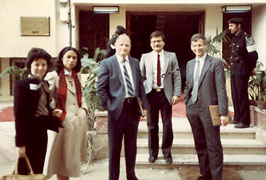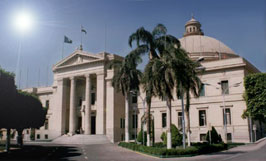Egypt: CAIRO UNIVERSITY
Development Research and Technological Planning Center (DRTPC) / Cairo University — Egypt
Duration: 1975 - 1986
Overview and Impact

The Cairo University MIT Program (CU/MIT) was the first major infrastructure building program of TDP (at that time called the Technology and Adaptation Program). As part of this program, the DRTPC was established as an autonomous center within Cairo University, thus beginning an era of cooperation between government and academia at Cairo University.
CU/MIT was designed to develop national Egyptian capabilities in socio-economic development using three analytic approaches:
- engineering analysis and project evaluation, addressing specific technical issues, including field and laboratory studies, design, and prototype development;
- economic analysis, focusing on project, sector, and national planning issues, and micro- and macroeconomics studies related to specific Egyptian development programs; and
- social science analysis of population and labor force issues, socioeconomic change, urbanization, extension of social services, and technology transfer strategies.

The MIT/CU collaboration lasted 11 years. During MIT's involvement, more than $36 million (1975 dollars) was allocated to CU/MIT and approximately 30 MIT faculty members and 200 graduate students from over 20 departments, laboratories, and centers participated in DRTPC. Several participants including Ph.D. recipients have served as cabinet members in the Egyptian government.
In addition to promoting the institutional development of the Center, CU/MIT projects made significant contributions to the development process in Egypt. The applications of CU/ research projects are endless. To name a few: Electrical distribution in Egypt was improved; groundwater use was enhanced allowing for double cropping; and a new model of discharge of water from Lake Nasser was developed, saving the Egyptian government several million dollars a year.
Research
The program's research activities focused on four broad areas:
- industrial development such as iron and steel, cement, aluminum, and automotive;
- infrastructure development including water, transport, housing, power, telecommunication;
- human resource development; and
- socioeconomic development, including macro-economic modeling, subsidies, tariffs, and foreign exchange.
Research Projects
Outreach

Conferences, seminars, workshops, and short courses upgraded the knowledge of Ministry participants in CU/MIT research projects. These programs also increased the awareness of faculty, Ministry staff, and other development practitioners of the research underway. Approximately 35 of these outreach activities took place.
In addition, an annual technical conference, held in Cairo, provided an opportunity for all participants from Cairo University, MIT and the Government of Egypt to present their research results to their peers as well as others interested in applications of science and technology to development. This technical conference also allowed the program to present state-of-the-art research emerging from the center and to demonstrate its potential benefits.
Lessons Learned
Critical features of the Cairo project include the fact that MIT provided assistance and know-how, but the Center was staffed by local, Cairo University faculty members. Every research project had an Egyptian faculty member and the endorsement of industry or government — this TDP innovation would be successfully replicated in future projects throughout MIT. In addition, the Center was instrumental in changing seniority-based salary reviews to merit-based reviews. Conducting contract research rather than solely relying on gifts and grants proved successful as well and is an enduring legacy of the MIT collaboration.
Sampling of MIT Faculty Involved
| Edward Allen | Professor of Architectural Design, University of Oregon |
| Rafael L. Bras | Edward A Abdun-Nur Professor, Civil and Environmental Engineering |
| James L. Kirtley, Jr. | Professor, Electrical Engineering and Computer Science |
| Suzanne D. Berger | Professor, Political Science |
| Gabriel R. Bitran | Nippon Telegraph and Telephone Professor of Management, Sloan School of Management |
| Nazli Choucri | Associate Director, TDP and Professor, Political Science |
| Eric J. Dluhosch | Professor Emeritus, Architecture |
| Peter S. Eagleson | Professor Emeritus, Civil and Environmental Engineering |
| Richard S. Eckaus | Professor Emeritus, Economics |
| Woodie C. Flowers | MIT Affiliate |
| Ralph A. Gakenheimer | Professor, Urban Studies and Planning |
| Elias P. Gyftopoulos | Professor Emeritus, Nuclear Science and Engineering |
| Donald R. F. Harleman | Late Professor, MIT |
| Frederick J. McGarry | Professor Emeritus, Materials Science and Engineering |
| David H. Marks | Professor of Civil Environmental Engineering & Engineering Systems Division |
| Carl D. Martland | Senior Research Associate, Civil and Environmental Engineering |
| Fred Moavenzadeh | Director, TDP, James Mason Crafts Professor of Engineering |
| Dan Roos | Professor of Engineering Systems |
| Joseph M. Sussman | JR East Professor, Civil and Environmental Engineering and Engineering Systems |
| Martin L. Weitzman | Professor, Economics, Harvard University |
| William C. Wheaton | Director, Center for Real Estate? |
| David Gordon Wilson | Professor Emeritus/Senior Lecturer, Mechanical Engineering |
| Nigel H.M. Wilson | Professor, Civil and Environmental Engineering |
